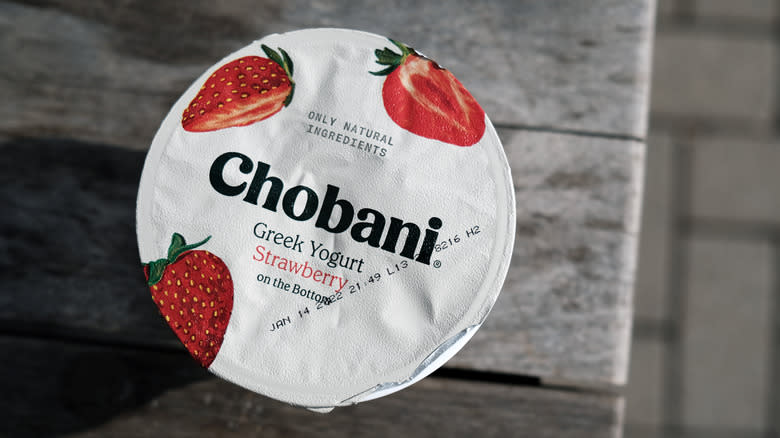What Yogurt Companies Don't Want You To Know

Yogurt lives in millions of fridges across the United States. It's popular as a breakfast food, snack, and even dessert. It seems like a fairly innocuous food, if not a healthy one — but there are some things yogurt companies don't want you to know. Now, we're certainly not claiming that yogurt is straight-up bad for you. Nor are we saying that all yogurt companies are evil corporations with terrible secrets (although some of them probably are). All we're trying to do is uncover some of the lesser-known facts about this popular food.
For starters, you might not know that some yogurt contains startling quantities of sugar — and some of those labeled as low-sugar have artificial sweeteners in them. You also may not be aware that some of the by-products of yogurt-making are harmful to the environment. Now, these are secrets that manufacturers probably want to keep under wraps.
We've got the juicy details about all of this and more. And, once you're armed with all the information you might want to know, it'll help you make an informed choice about what yogurt to buy and what to leave at the store.
Read more: Trader Joe's Frozen Desserts Ranked Worst To Best
Some Yogurt Contains A Lot Of Added Sugar

Many of us grab yogurt off the shelf thinking it's a healthy snack. But, do you check the sugar content first? What yogurt companies don't want you to know is that some varieties contain a lot of added sugar — especially the fruity ones -- and it's not uncommon to find over 20 grams of sugar in a single serving. It can be tough to work out which sugars come from fruit and which are added, but most have a significant amount added in addition to the fruit. If sugar, high fructose corn syrup, or other sweeteners are close to the start of the ingredient list, that's a bad sign.
If you want to limit the amount of sugar you eat from yogurt, avoid yogurts that have a large amount of sugar in them. Opt for plain, unsweetened yogurt and add your own fresh fruit or a drizzle of honey or agave nectar. This way, you control the sugar content while still reaping the benefits of probiotics and protein that yogurt offers.
But, you don't have to totally banish yogurt from your diet. Sugar, in moderation, is fine to eat. In fact, our bodies need some sugar for energy. The key is balance. Enjoy your yogurt, but don't let the hidden sugars catch you off guard. Take a minute to read the labels when you're shopping for yogurt so you know what you're getting for your money.
Not All Yogurt Contains Live Cultures

The folks that make yogurt would like you to think that all yogurt contains live cultures. These are often known as good bacteria and can improve your gut health. While not every yogurt has added probiotic bacteria, it's commonly believed that every type has live cultures, as these are used as a starter to make the yogurt.
And, yes, this is how yogurt is produced, but some of it no longer contains this beneficial bacteria and therefore will do nothing for the wellbeing of your digestive system. These varieties have been heat treated, which kills the cultures. But, it's easy to check if your yogurt contains live cultures. Look out for the "Live & Active Cultures" seal on a product, which is handed out by the National Yogurt Association. When a product has this label, that means it contains a minimum of 100 million cultures per gram.
Sugar-Free Or Low-Sugar Yogurts May Contain Artificial Sweeteners

The thing to know about sugar-free and low-sugar yogurts is that they often contain artificial sweeteners, such as xylitol and aspartame. So, they might not contain sugar, but they do contain other forms of sweetening agent. Maybe you're wondering if you should be concerned about this.
According to Very Well Health, some studies suggest that artificial sweeteners could be linked to a range of health issues. These include headaches, digestive problems, and type 2 diabetes. There's also talk of a possible connection to cancer, although this is based largely on animal studies, not human ones. The concern being explored is that these sweeteners might disrupt our gut microbiome, affecting everything from digestion to immunity. However, the results of these hypotheses are far from conclusive yet. And, it's worth noting that the FDA has classed them as safe for human consumption. We're not saying that you should definitely avoid artificial sweeteners, just that you should think before consuming them excessively.
So, what should you do if you want to add more sweetness or flavor to your yogurt without artificial sweeteners or real sugars? Ideas include adding fruit, sprinkling on some cinnamon, using applesauce, splashing in some vanilla extract or other extracts, or even adding sweet potato.
Some Greek Yogurt Contains Additives To Thicken It

Greek yogurt fans, take note. This variety of yogurt is known for being especially thick and creamy, making it a firm favorite among many. It's great for snacking on and adding to granola, but its thick consistency also makes it great for cooking. Due to its creamier texture and thick consistency, it can't easily be substituted with regular yogurt in recipes. You might believe what you're buying is the real deal, when actually it's thickened in other ways.
True Greek yogurt is thickened via a process of straining. This lets the excess liquid drain off, so you're left with more thick, creamy goodness. It can be strained up to three times to get it to the correct consistency. But, this straining process takes time. It also means it takes more milk to get the same volume of Greek yogurt versus regular yogurt, because some of the volume is strained away. The result is that it's significantly pricier to produce.
It might be for this reason that some yogurt manufacturers don't produce true Greek yogurt. Instead, they sell regular yogurt with additives, such as milk or whey protein concentrates or cornstarch, used to thicken it. This is usually sold as Greek-style yogurt. It might have a similar texture, but Greek-style yogurt has significantly less protein. Some also notice a difference in flavor.
You Can Make Your Own Yogurt In An Instant Pot

Here's a little secret that yogurt companies might not want you to know — it's pretty easy to make your own yogurt in an Instant Pot or some other multicookers. All you need is milk, a thermometer, and a couple of tablespoons of live yogurt. It takes around 10 hours in total and you're left with a yogurt that not only contains minimal ingredients (which is great if you're put off by additives) but also tastes incredible.
After heating the milk in your Instant Pot and letting it cool somewhat (which is where the thermometer comes into play), you stir in the live yogurt, hit the "yogurt" setting on the appliance, and let it do its thing for 8 hours. The live yogurt acts as a starter, the good bacteria in it multiplying to help the yogurt form. You can also buy starters, if you prefer, but this is a cheap and accessible alternative. If you'd known before how easy it is to make your own, perhaps you would have put less money into the pockets of Big Yogurt.
Some Yogurts Contain Gelatin

It is an unfortunate truth for vegetarians and anyone who avoids certain animal products for religious reasons. After all, you probably wouldn't think to check the packet for non-vegetarian ingredients. But, gelatin can be used as a thickener, especially in set yogurts or nonfat yogurts (since removing the fat can make them overly liquidy).
For those not in the know, gelatin is made from animal bones, skin, ligaments, and cartilage. These are processed to remove the collagen, which acts as a gelling or thickening agent in foods. The parts usually come from cows or pigs, meaning that gelatin is often not Kosher or not Halal, depending on its origins. However, it's certainly not the case that all yogurt contains gelatin. It's only occasionally used as an ingredient. So, if it's something you'd like to avoid, always check the packaging carefully when buying.
A Yogurt By-Product Called Acid Whey Causes Environmental Issues

Acid whey is a by-product of Greek yogurt production. For every 7,000 gallons of milk used to make Greek yogurt, roughly 5,000 gallons of acid whey is produced. As the name suggests, it's whey with high acidity. It can be a problem to dispose of because it can't be evaporated without expensive specialist equipment, and it isn't used in other products the way that sweet (non-acidic) whey is used in protein powders and similar.
This causes yogurt manufacturers to pay farmers to take it and spread it over their fields, but this can lead to environmental issues when runoff ends up in waterways. Acid whey removes oxygen from water, so when it gets into rivers and lakes, it can kill fish and other wildlife. A 2008 acid whey spill in Ohio killed over 5,400 animals, predominantly fish. So, there is a dark side to the Greek yogurt you love so much.
Not All Yogurt Is High In Protein

Yogurt is sometimes touted as a high-protein food, so you might be surprised to find out that some of it is significantly lower in protein than other types. Because true Greek yogurt is strained to make it thicker and creamier, it contains more milk proteins and less liquid than regular yogurt.
Per 8 ounces of Greek yogurt, you get roughly 24 grams of protein, while the same quantity of regular yogurt contains around 13 grams of protein. That's a significant difference and one of the reasons why Greek yogurt is particularly popular. Of course, the exact protein content varies between brands, so you should always check the packaging to know what you're in for.
There are other differences in nutrition between regular and Greek yogurt, as well. For instance, 8 ounces of the Greek stuff contains 9 grams of sugar, while the same amount of regular contains 17 grams of sugar. Greek yogurt isn't all good, though. It's lower in calcium than regular yogurt, with 22% of the daily value per 8 ounces, versus 34% of the daily value for regular yogurt.
Serving Sizes Can Be Misleading

You might look at the nutritional information before you choose which yogurt to buy, weighing up the relative pros and cons of each. But, serving sizes can be misleading. There can be more than a single serving per container, even in containers that you think are small enough to be just for one. This is a trick that some yogurt companies use to make you believe that a product is lower in sugar calories than it really is.
So, you might think a yogurt cup contains just 5 grams of sugar, for instance, but really that cup contains two servings (according to the manufacturer). This means that if you eat the whole thing, you'll be consuming 10 grams of sugar. You need to be mindful of how many servings a carton technically contains and whether that's actually the serving size you're going to eat — a lot of the time, it won't be.
But, of course, you can also look on the bright side of this. When portion sizes are underestimated, it also means you're going to get more of the good stuff. So, if you eat double the portion size on the carton, you're going to get double the protein, calcium, and other nutrients contained in yogurt.
Frozen Yogurt Isn't Necessary Better For You Than Ice Cream Or Soft Serve

You might think of it as the healthier alternative, but is frozen yogurt really better for you than soft-serve or other ice cream? It really depends on how you look at it, but frozen yogurt isn't necessarily a healthier choice. One of the reasons for frozen yogurt's healthy reputation is the live cultures it contains. And, we'll give it that — these beneficial bacteria are certainly good for your gut health. It's also a lower-fat choice, but fat is good for you and an essential part of everyone's diet. On the flip side, frozen yogurt often contains more sugar than soft-serve or ice cream to counterbalance the tangy yogurt flavor.
Then, of course, there's the fact that food is for enjoyment. You shouldn't be weighing up how healthy or unhealthy every food you consume is. It's absolutely fine to eat foods you like, whatever their nutritional content. If you prefer ice cream and soft-serve over frozen yogurt, go ahead and eat them. It's not as though you're intending on eating nothing but frozen desserts for the rest of your life. On the other hand, if frozen yogurt is your jam, go ahead and fill up on it. You only live once.
Low-Fat And Nonfat Yogurt Might Be Unhealthier Than Full-Fat Yogurt

Yogurt manufacturers make a lot of money off their low-fat and nonfat yogurts. Dieting is big business — the whole industry was valued at over $190 billion in 2023 — and companies earn big bucks off these low-fat alternatives. So, they're not going to want you to know that lower-fat versions might actually be unhealthier.
Low-fat is often seen as better, but that isn't always the case. First off, fat is an essential part of a healthy diet. Yogurt contains mostly saturated fat and, it was once believed that all saturated fat was bad for the heart, while unsaturated fat (such as that found in olive oil) was heart-healthy. But, recent studies seem to show that it's more complicated than that. The source of the saturated fat matters — so saturated fats from processed foods are best avoided, but those from full-fat dairy don't have ill effects and might actually reduce the risk of heart disease.
On top of this, low-fat and nonfat yogurt usually contains large amounts of sugar to make up for the lack of flavor that comes from stripping out the fat. It tends to be heavily processed and may have added flavorings, starches, pectin, and whey protein. The processing of lower-fat yogurts can also kill the good bacteria that makes this food good for your digestive system. Not to mention that taking the fat away also gets rid of the fat-soluble vitamins usually found in yogurt.
Eating Too Much Yogurt Can Be Bad For You

Yes, yogurt is good for you, but you can have too much of a good thing. When you eat yogurt every day, you might not be able to achieve as much of a balanced diet that comes from eating a wide range of foods. Instead, it might be better to eat yogurt some days and other nutrient-rich snacks or meals on other days to achieve more diversity in your diet.
Those with an allergy to milk proteins would also experience unwanted side-effects, such as bloating, digestive issues, and rashes. But, it's possible to be sensitive to milk proteins, even when you aren't allergic, so if you experience bloating or stomach troubles after eating too much yogurt, this could be why. There's also a risk of excessive yogurt-eating leading to small intestine bacterial overgrowth.
But, eating a lot of yogurt also comes with its benefits, including better bone health from the calcium and better digestive health from the good bacteria it contains. So, like many things in life, it's all about balance. There's nothing wrong with eating yogurt regularly, but don't overdo it. Especially if the yogurt you eat contains a lot of sugar.
Yogurt May Last Beyond Its Expiration Date

Have a carton that got pushed to the back of the fridge and forgotten about? Luckily, yogurt may still be good beyond its expiration date. However, this comes with some caveats. In some cases, expired yogurt could lead to some nasty gastro symptoms. So, you should be careful if you don't want to become too well acquainted with your toilet bowl.
First off, you should check if the yogurt has a best-before date or a use-by date. Most yogurts have best-before dates, which are just guidelines — the food in question may still be perfectly edible beyond this date. A use-by date is more set in stone, so it's best to avoid yogurt that's gone past its use-by date. Regular yogurt can usually last for 1 to 2 weeks beyond the stated best-before date, if unopened. However, yogurts with a layer of fruit at the bottom are more prone to growing mold and bacteria, so you should avoid them once they're gone more than a few days past their best-before.
But, you should also look for signs of spoilage. These include a bad smell or a thick layer of liquid on top of the yogurt (a thin one is normal, even long before the expiry date). If you're still unsure, taste a tiny amount. If it tastes bad, you'll know you should turf it, but won't be enough to get you sick.
Read the original article on Mashed


